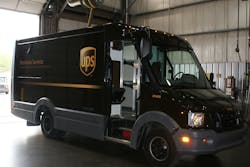UPS: Diesel-powered, composite-body truck cuts fuel use 40%
United Parcel Service has ordered 150 “package cars”-- featuring bodies built of composite plastic panels-- that the delivery giant said will reduce diesel fuel consumption by 40% compared to its current aluminum-body P70 package-car model.
UPS said it expects to take delivery of the new package cars in this year’s fourth quarter and will place them into service on high-mileage routes, chiefly in the Western United States.
Five prototypes for the “plastic truck,” dubbed CV-23, resulted from a three-year development process with truck builder Utilimaster and engine and chassis supplier Isuzu.
This April, UPS completed a year of field-testing of the Utilimaster/Isuzu Reach vehicles in five “extreme” operating regions, said UPS director of automotive engineering Dale Spencer during a recent teleconference. The Reach is built on an Isuzu NPR Eco-Max chassis and has a body designed by Utilimaster.
“The testing was done to see if composite vehicles could withstand UPS delivery cycles and provide environmental benefits,” said Spencer. “The prototype vehicles were tested and met the challenge” by reducing the company’s fuel use and carbon footprint while standing up to the rigors of package-car service, he added.
The CV-23 is powered by a 4-cyl., 150-hp. Isuzu diesel—smaller than the diesels that power P70s-- mated to a six-speed Aisin automatic transmission. Weighing in about 8600 lbs, the prototype is 900 lbs. less than a P70. However, its cargo capacity is about 70 cu ft less than that of the aluminum truck.
The prototypes were constructed using a range of plastic composites, pointed out John Knudtson, Utilimaster’s vice president for product development. These included injection-molded polyurethane for various body and fender panels; polyethylene sheet-molding compound (used in the body of the Chevy Corvette) for some structural members; and fiberglass-reinforced plastic (FRP) for the roof.
Spencer credited the prototype’s 40% fuel savings to three factors: Advanced powertrain technology, the 900-lb. overall weight reduction, and improvements to body aerodynamics.
Along with fuel efficiency, Spencer said UPS tested the five prototypes for durability, repair qualities and structural strength. These five locations and their extreme conditions were chosen for the testing:
1. Lincoln, NB– rough country back roads
2. Albany, NY– tough winter conditions
3. Tuscon, AZ– severe heat of the desert
4. Flint, MI– long urban route near Isuzu headquarters
5. Acworth, GA– high-mileage route near UPS’s automotive team
Notable features of the CV-23 pointed out by Spencer include molded components that are easily replaced if damaged; a roll-up door and fold-up shelves to make loading more efficient; a spring bumper that is more durable for dock-loading; and use of LED lights to save energy.
Along with achieving the desired 40% increase in fuel efficiency, ease of repairs, durability and maintenance of the prototypes “proved to be positive,” pointed out Spencer. He added that as a result of the testing, “UPS has become even more comfortable with composite material and will consider adding more composite components into larger vehicle types to reduce vehicle weight.”
